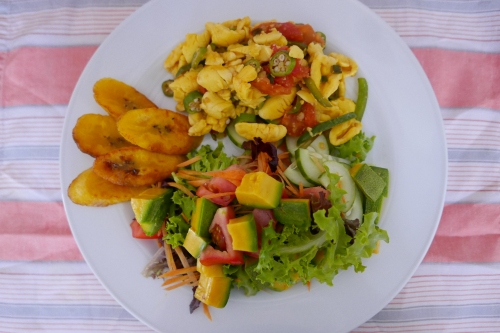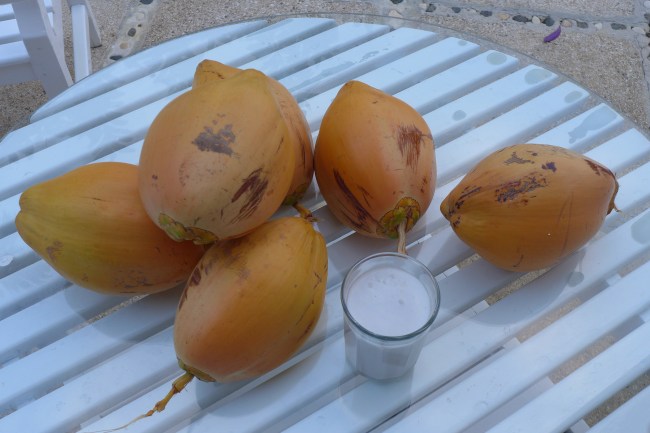
When I first started going to Buenos Aires seven years ago, it was very difficult to find real food. Even the grass-fed beef Argentina is known for worldwide, was quickly being replaced by feedlot beef. In the supermarkets it was impossible to find plain yoghurt; everything was loaded with sugar and additives. There were a few health food stores and restaurants but they were still stuck in the old school belief that soy and vegetarianism is healthy.
Argentines eat mostly bread in the form of pasta, pizza, sandwiches and pastries, with meat, cheese and few vegetables, which made it very difficult to eat well when I was there. However, when I returned in 2010 to visit my in-laws, things had changed. There were now several organic food delivery services and more health food stores and restaurants, but the biggest change was the opening of two farmers’ markets: Sabe La Tierra in San Fernando and El Galpon in La Chacarita. Now when I visit, as soon as I arrive I go to the nearest market to stock up on real food, which has made eating healthy a lot easier when I am there.
During my recent visit in November, my first stop was Sabe La Tierra in San Fernando. The market is held every Saturday at the charming San Fernando, Tren de la Costa train station, where the stalls are set up along the train platform. The most impressive stall is Tierra Florida, owned by Fabio, who sells medicinal herb tinctures and makes various smoothies, using fruit mixed with water kefir, kombucha or coconut milk and adds superfoods such as pollen, cacao, maca, aloe, purple corn, ginger, coca and moringa. Fabio has had his stall at the market for two years.

Fabio in front of his stall Tierra Florida

kefir and coconut milk

cocoa beans

kefir smoothies

kombucha and kefir

coca, maca, ghee, spirulina, purple corn and dried kefir grains

superfoods smoothie
The movement still has a long way to go in terms of real food and there is still a big emphasis on vegan and vegetarianism. There is no raw cheese or raw milk being sold at the market, only pasteurised, partially grass-fed organic yoghurt and milk from a cooperative of small farmers called La Choza. At the Coeco stall, another cooperative, their chicken and eggs are marketed as pastured but the chickens are fed grains which most likely are GMO as they are not certified organic and the hens are fed GMO soy. I spoke with the owner at Coeco who told me that in March their eggs are going to be certified organic—a huge improvement. Another stall owned by a lady named Susanna, at the end of the platform, also sells eggs; the hens are fed herbs, corn and some commercial feed but again these probably include GMO grains. Since Argentines have started learning about the effects of GMOs from soy, their largest producing crop, there is pressure for producers to have their products certified organic, as most are still getting away with marketing them as healthy and organic when they are fed GMOs.

raw flax seed flour wraps

I was happy to find natural apple cider vinegar as it is impossible to find vinegar in the supermarket without preservatives

La Choza pasteurised, grass-fed milk and yoghurt

Coeco pastured chicken and eggs, soon to be certified organic

San Fernando train station

Pasteurised goat’s cheese

eggs wrapped the old fashioned way in newspaper
Across the train tracks at La Cañada stall, there is always a long queue of people waiting to buy their organic fruits and vegetables. Here they sell local organic blueberries, the ones imported all the way to the U.S. during the winter months when blueberries aren’t available.

La Cañada stall selling organic fruits and vegetables

organic fruits and vegetables

organic local blueberries

Sabe La Tierra market

bee products
A few stalls further along there is La Areperia de Buenos Aires. An arepa is a Colombian and Venezuelan cornmeal patty which is grilled or fried and then sliced and usually stuffed with cheese. What differentiates La Areperia de Buenos Aires from the typical arepas you find in the U.S. is that they are made in the traditional, rustic style, using corn kernels that are first boiled and then ground, instead of cornmeal, to produce a more flavourful arepa. The arepas look delicious but when I asked the owner, Hassan, if the corn is organic, his answer was vague. He told me that his producer says it is organic but it isn’t certified, in which case I wouldn’t take the risk, as most corn is GMO.

various toppings for the arepas

guacamole

grilled arepas

La Areperia de Buenos Aires
The health food movement in Argentina has grown tremendously since my last visit, with hopefully more certified organic products to come. Sabe La Tierra market is now held at two more locations, in Tigre on Wednesdays and in Vicente López on Saturdays. As of January this year, Sabe La Tierra started Mercado de Noche, a night market held at different locations from six till ten in the evening. Another market which I have not been to yet, Buenos Aires Market, is held every month since April 2012, at various locations for two days over the weekend, selling organic and healthy food.





































































